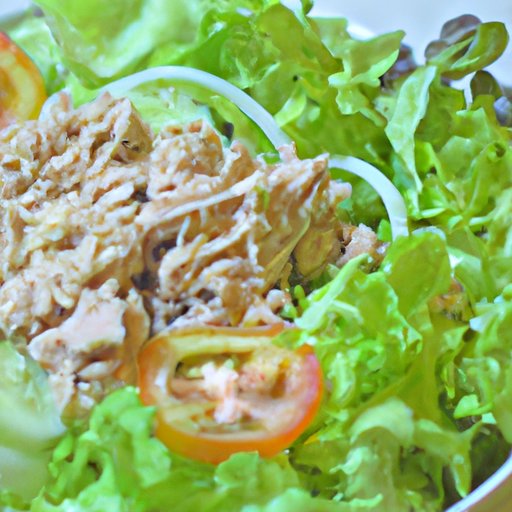Introduction
Tuna salad is a popular dish that can be found on restaurant menus and in home kitchens around the world. But is it really healthy? This article will take a closer look at the nutritional profile of tuna salad and explore its potential health benefits and risks.
Analyzing the Health Benefits of Tuna Salad
Tuna is one of the most widely consumed seafoods in the world. It is an excellent source of protein and omega-3 fatty acids, which are essential for good health. It is also rich in vitamins and minerals such as vitamin D, selenium, and phosphorus.
The potential health benefits of eating tuna include improved heart health, reduced inflammation, enhanced cognitive function, and increased energy levels. Studies have also shown that regular consumption of tuna may reduce the risk of certain types of cancer.

Exploring the Nutritional Value of Tuna Salad
When it comes to the nutritional value of tuna salad, it depends on the ingredients used. Generally speaking, it is high in protein and low in fat, making it a good choice for those looking to maintain or lose weight. Tuna salad typically contains tuna, mayonnaise, celery, onion, and other vegetables, as well as seasonings such as salt and pepper.
In terms of macronutrients, tuna salad is a good source of protein, with approximately 20 grams per serving. It is also relatively low in fat, with about 5 grams per serving. In terms of carbohydrates, it contains about 10 grams per serving, mostly from the vegetables.
Tuna salad is also rich in micronutrients, with a variety of vitamins and minerals. It is particularly high in vitamin B12 and selenium, both of which are important for optimal health. It also contains some calcium, iron, and zinc.

Examining the Role of Tuna Salad in a Balanced Diet
In order to get the most out of tuna salad, it should be part of a balanced diet. The Dietary Guidelines for Americans recommends that adults eat at least two servings of seafood per week, including one serving of oily fish such as tuna. Eating a variety of foods from all the food groups is essential for optimal health.
Eating tuna salad can provide some potential health benefits, but there are also some potential risks. Tuna contains mercury, which can be harmful if consumed in large amounts. It is also high in sodium, so it is important to limit the amount of added salt when preparing tuna salad.

Pros and Cons of Eating Tuna Salad
When deciding whether or not to include tuna salad in your diet, it is important to consider the pros and cons. On the positive side, tuna salad is a nutritious and convenient meal option that is high in protein and low in fat. It is also a good source of essential vitamins and minerals.
On the downside, tuna salad can be high in sodium and may contain unhealthy ingredients such as mayonnaise. Additionally, it is important to remember that tuna contains mercury, which can be harmful if consumed in large amounts.
Is Tuna Salad Really Healthy?
The answer to this question depends on several factors. When considering the nutritional profile of tuna salad, it is relatively healthy. It is a good source of protein, vitamins, and minerals, and it is low in fat and calories. However, it is important to remember that it is also high in sodium, so it is best to limit the amount of added salt when preparing it.
When considering the overall diet, tuna salad can be a healthy addition. It is important to remember to include other healthy foods in the diet, such as fruits and vegetables, and to limit processed and fried foods. Additionally, it is important to remember to limit the amount of tuna consumed due to the potential risks associated with mercury.
Evaluating the Impact of Tuna Salad on Weight Loss
Tuna salad can be a helpful component of a weight loss plan. It is relatively low in calories and high in protein and fiber, both of which can help promote satiety. Additionally, it can be a convenient and nutritious meal option for those who are trying to lose weight.
Comparing Tuna Salad to Other Healthy Salads
When it comes to comparing tuna salad to other healthy salads, there are some important differences to consider. For example, while tuna salad is a good source of protein and omega-3 fatty acids, other salads such as Greek salad or bean salad can be higher in fiber and lower in sodium. Additionally, some salads may contain more vegetables, which can provide additional vitamins and minerals.
Conclusion
Overall, tuna salad can be a healthy addition to the diet. It is a good source of protein, vitamins, and minerals, and it is relatively low in calories. However, it is important to remember that it is also high in sodium and can contain unhealthy ingredients such as mayonnaise. Additionally, it is important to limit the amount of tuna consumed due to the potential risks associated with mercury.
When considering the overall diet, tuna salad can be a beneficial component. It is important to remember to include other healthy foods in the diet, such as fruits and vegetables, and to limit processed and fried foods. Additionally, it is important to remember to limit the amount of tuna consumed due to the potential risks associated with mercury.
In conclusion, tuna salad can be a healthy addition to the diet when consumed in moderation. It is important to consider the nutritional profile of tuna salad and the overall diet when deciding whether or not to include it in your diet.
(Note: Is this article not meeting your expectations? Do you have knowledge or insights to share? Unlock new opportunities and expand your reach by joining our authors team. Click Registration to join us and share your expertise with our readers.)
